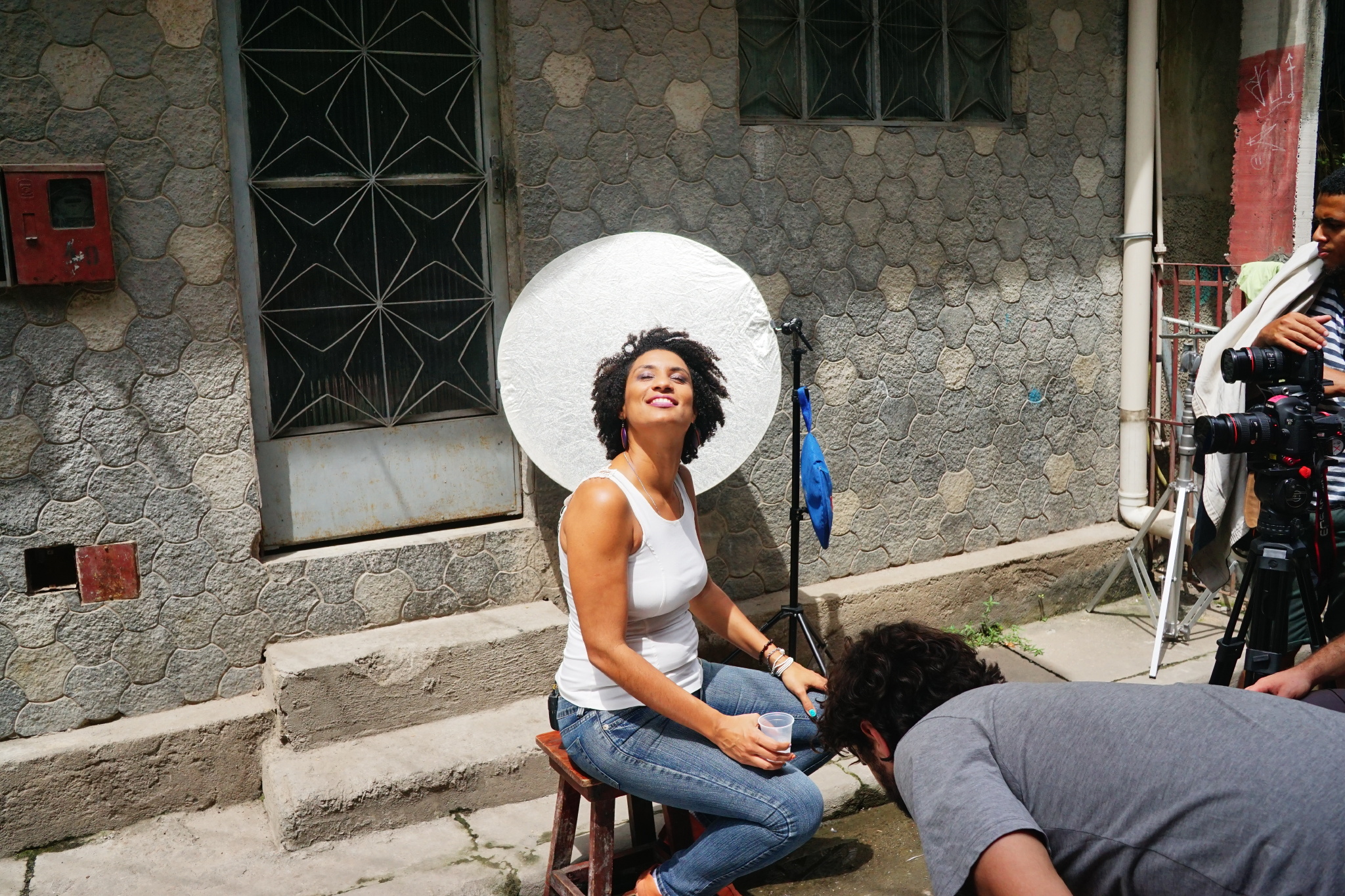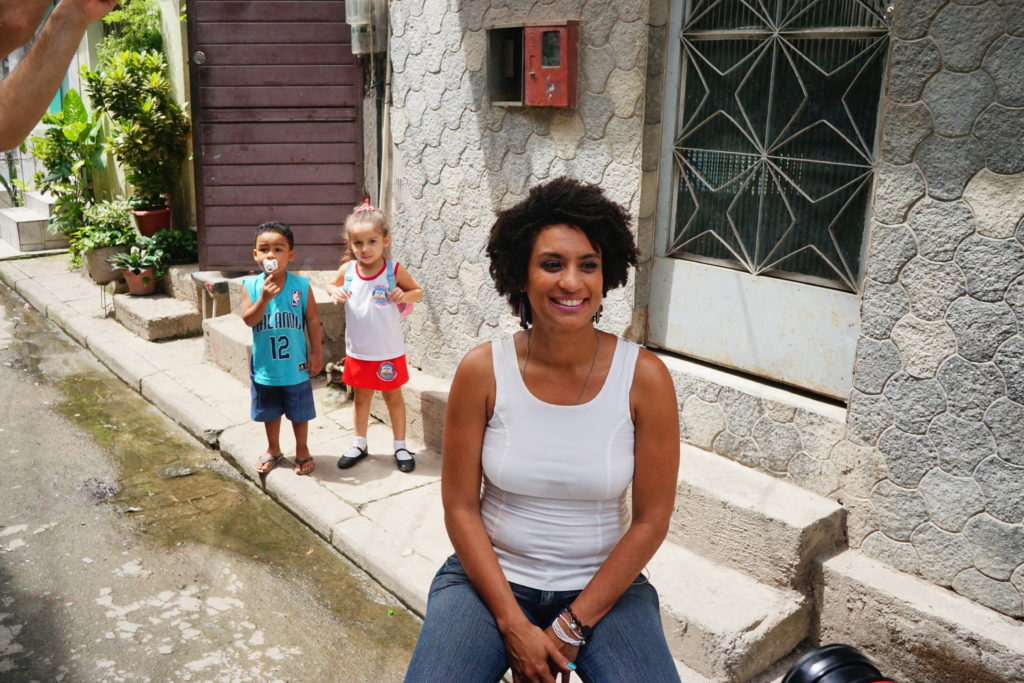Almost two years ago, GroundTruth fellow Catherine Osborn and I stood in the middle of Rio de Janeiro’s Manguinhos favela with Marielle Franco, who was then 37 years old. She was campaigning for a spot on Rio’s historically white and male city council. Her campaign flyers were silhouettes of her vibrant afro. Her slogan “I am because we are,” was a nod to the Zulu phrase “Ubuntu” and Brazil’s often neglected African heritage.
“I’m black, I’m a woman, and I am from the favela,” she told us. “My people suffer the most. It’s time we get to spaces where we can make decisions and create change.”
When Catherine and I met Franco, she was rocking her trademark bright colors, drop earrings, pink lipstick, and gorgeous afro. We were in awe of her resilience, her determination, her sensuality, her grace. “What a boss,” we kept telling each other shortly after meeting her.
After years of struggle, Franco finally got to the space where she could make change — she was elected to the Rio city council. But last night, she was shot dead while driving back from a black women’s empowerment event. Her murder has sent shockwaves through the country. #JustiçaParaMarielle — “Justice for Marielle” — is trending on Twitter and demonstrations have been organized across Brazil.
“It’s staggering, and a chilling reflection about Brazil today, that they thought they could do this with impunity,” journalist Glenn Greenwald tweeted on Thursday.
One of six

Franco, a sociologist, was elected in 2016 as part of the leftist Socialism and Liberty Party (PSOL). She was one of only six women on Rio’s 51-person city council. During her time on the council, she introduced bills to chip away at some of Brazil’s most pressing issues like sexual violence and the incarceration of black youth.
Franco and the 31 other black women who won city council seats in other Brazilian state capitals in October 2016 are part of a generation of young black Brazilians who have become increasingly vocal inside and outside statehouses. But as we reported for Newsweek magazine, these gains are now under threat, as a new government seems poised to undermine the social policies that have elevated so many black Brazilians, creating a new sense of urgency for the country’s black activists.
“If we don’t stand together and mobilize now,” Franco told us in 2016, “we will never be in the position to make decisions or create change. We’re already living on the limit.”
Franco devoted much of her career to opposing police brutality and trying to improve the conditions of Brazil’s favelas, or low-income neighborhoods. She grew up in a favela in Maré, a part of northern Rio. She got pregnant when she was 18 and put herself through college on a minimum-wage salary, teaching pre-school.
An activist for black lives
Partially inspired by the Black Lives Matter movement in the U.S., Brazilian activists have increasingly focused on police killings of black youth. In Rio alone, there were 1,275 recorded killings by police between 2010 to 2013, and 79 percent of those victims were black, according to Amnesty International. Most of those deaths were in the city’s favelas, which have been heavily militarized in an attempt to take back entire neighborhoods from powerful drug traffickers. Critics say this approach does not address the poverty at the root of drug-related crime. Nor does it prevent innocent people from being caught in the crossfire.
Though many of these killings happened while the Worker’s Party was in office, the previous administration had proposed to decrease homicides through targeted police retraining and monitoring, plans that President Michel Temer’s government has now discarded. In fact, Franco recently spoke out against Temer’s decision to send military troops to Rio to contain escalating violence there. She had recently been named a director of a committee to investigate any reports of abuse of force in the military takeover of security forces. The takeover has been in effect since February 16, despite Rio’s not even ranking in Brazil’s top ten cities for its homicide rate.
“How many more will have to die for this war to end?” Franco recently tweeted after a black man was killed on his way to church.
“Every now and then you meet someone in politics that makes you believe that the whole thing is worth it, despite all the dirt and decay and corruption that drowns it, that it can actually improve things for people,” Greenwald tweeted. “@mariellefranco was one of those people – for so many.”
Last night, just hours before her murder, she opened an event offering gratitude to a fellow group of black women who had gathered to discuss routes to empowerment and participation in civil society.
“A city council seat of a black woman, from a favela, from the peripheries, needs to be guided in its focus by social movements, by civil society, by who is trying to strengthen us in the places where we don’t see ourselves,” she said at the event, wearing her characteristic blue dangly earrings and dark red lipstick. “When we don’t find each other, erasure is what others present as our profile. So to have our house, to have our space, to have our time, to have our place of resistance, to do this event in the middle of a series of days of activism — while we know that we’re active and resisting all the time — I just want to thank you.”
Additional reporting by GroundTruth fellow Catherine Osborn in Rio de Janeiro


































